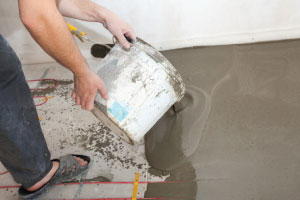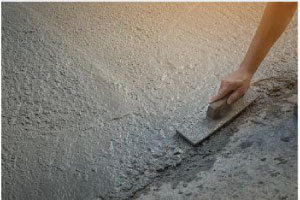 What is Concrete Topping?
What is Concrete Topping?
The process of applying a layer of high-strength concrete on top of an older, more worn-down layer of concrete is referred to as a concrete topping. It is nothing more than laying a layer of concrete over the top of the existing slab in attempt to provide a finished floor surface on top of the concrete that was already there.
In setting bus shelters and carparks, for a seamless and elevated level surface, or producing an impenetrable surface layer may require a new surface because the previous one may have become worn out or might not be structurally adequate for the particular purpose. This could include installing large pieces of hardware and equipment that cause implications and motion at workshops, industrial plants, and garages.
The application of concrete topping can sometimes be done instantaneously after the building of the base surface in order to offer a surface that is both rigid and efficient in terms of cost.
In the realm of procedures for maintenance, rehabilitation, and reconstruction, the concrete topping is typically categorised as one of the more sustainable and cost-effective options. Their depth might range anywhere from two inches (or fifty millimetres) to ten inches (250mm).
Applications of Concrete Topping
1. Method of Waterproofing
It is possible to waterproof constructions by topping them with concrete. The addition of a new layer makes the structure more impermeable than it was previously.
2. Expands the Capacity of Existing Structures
It is possible for high grade concrete topping to amplify the bearing stability of a structure if it is anticipated that the structure will be subjected to high superimposed weights during its lifetime.
3. Removes Unevenness
It is possible to utilise concrete topping to create level flooring with it. The additional layer, once levelled, will eliminate the unevenness that was present on the surface.
4. Restores Capacity for Operation
If a concrete structure has been damaged by embrittlement, acidification, or water damage, and as a result, the structure has lost its resilience, maintainability, and visual value, then concrete topping may be able to assist to restore the building to good condition. Both the strength and the durability will develop as a result of this training.
5. Restores Durability
The concrete surface of inflexible pavements becomes less firm over time as a result of the wear and tear induced by passing automobiles. This results in a reduction in the material’s resilience to abrasion. The surface’s abrasion resistance is improved with the application of concrete topping.
6. Repairs the Surfaces That Were Damaged
Concrete topping is an option for worn out parking lots in order to reverse the wear and tear that has been caused by time.
Why Concrete Topping is a Smart Choice?
-
Establishes a Definite Slope After Drainage Construction
In slab layout and construction in particular, deformation in the slab can present a wide variety of technical challenges that need to be solved. To prevent slab deflection, concrete topping slabs can provide particular slopes to drains after construction has been completed. This is one-way topping slabs can help.
-
Revitalisse a Concrete Slab During Reconstruction
It’s possible that the land you’ve chosen for the renovation already features a concrete slab, and that slab has a breadth that will prevent it from supporting the buildout’s structural capability.
It is possible in this scenario for the overall thickness of the slab to be increased by adding a bonded topping slab, which is integrated with the current slab to form a composite. This may make it possible for a buildout that was not intended by the original architects and designers of the building.
-
Safeguard the Area Under the Slab to Optimise the Stability of the Building
The adage that you only get one shot to do it properly when it comes to under slab vapour protection has been one that we’ve been using for decades. This is still the case, at least under the entirety of the slab; however, topping slabs offer a single additional opportunity to get it right: under the new slab.
When your infrastructure is old enough to not incorporate an under-slab vapour barrier, you can substantially improve the interior air quality and practically abolish the mold-causing water vapour dispersion by including a vapour barrier in an unbonded concrete topping slab. This will allow your buildout to no longer include an under-slab vapour barrier. Your redesigned building envelope will be appreciated by the people who live in it.
-
Produce Wearing Surfaces for Use in Applications
Take for example that your buildout requires additional functionality such as a plaza deck, freezer slab, or insulation. For instance, if your initial slab did not have the appropriate cushioning to handle a freezer slab, you can put those components beneath the topping. This will allow the freezer slab to be used.
When considering this option, the possibility for the site to be redeveloped significantly increases. Building owners now have access to an increased number of prospective buildout sites than they have had previously thanks to the concrete topping slab.
-
Load-carrying Capabilities are Improved by the Use of Unbonded Toppings

It is possible for this reason to integrate with others on this list in order to fulfill not only the engineering requirements of a buildout but also additional requirements, such as vapour infiltration or brownfield restoration.
Because a bond breaker, such as a vapour barrier or another membrane, may be introduced between the unbonded concrete topping slab and the preexisting slab in order to ameliorate other situations, the unbonded topping slab does not become compound with the existing slab.
Nevertheless, given that the existing slab continues to function as a core with a high load-bearing capacity, the buildout’s load-carrying capacity may be increased through the addition of an unbonded topping slab.
Concrete Floor Topping Contractors Sydney
Here in EzyGrind, we are optimistic in our expertise to offer solutions in concrete grinding polishing and topping in New South Wales that intends to surpass your requirements as a result of our substantial experience in the residential, commercial, and industrial concrete grinding industry in Australia. Get a quote today!
Get a quote for our cementitious floor topping services by filling out the form below:
